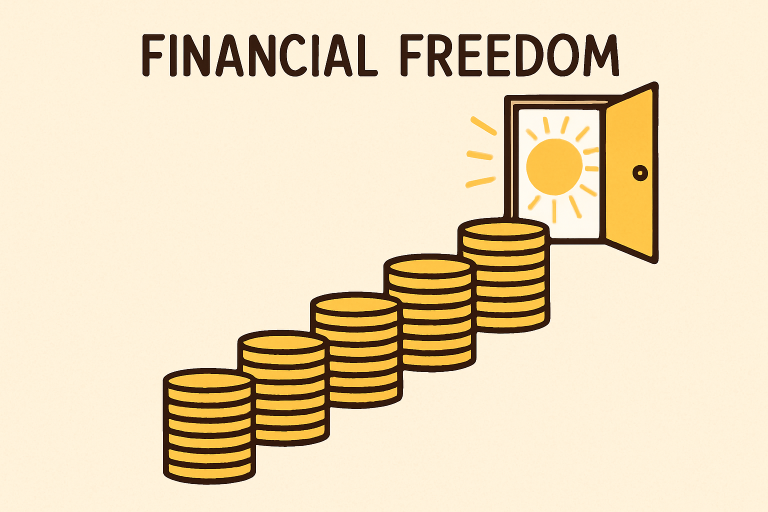Key Takeaways
- Establishing clear, achievable financial goals is crucial.
- Creating and adhering to a realistic budget helps manage expenses.
- Building an emergency fund provides a safety net for unforeseen events.
- Investing wisely and diversifying portfolios can enhance wealth growth.
- Continuous financial education empowers better decision-making.
Table of Contents
- Setting Clear Financial Goals
- Creating a Realistic Budget
- Building an Emergency Fund
- Investing Wisely
- Diversifying Investments
- Continuous Financial Education
- Seeking Professional Advice
- Monitoring and Adjusting Your Plan
- Conclusion: Turning Smart Financial Planning into Lifelong Freedom
Financial freedom, the ability to make life choices without being overly stressed about money, is a dream shared by many. Turning this dream into reality requires more than just luck; it requires strategic planning and disciplined action. By understanding essential principles and taking small, consistent steps, anyone can lay the groundwork for a secure and independent future. To see how others have successfully pursued this path, read authentic Dow Janes reviews and see how smart planning makes a real difference for individuals from all walks of life.
Financial planning is not just about creating budgets or investing money; it’s about cultivating habits and acquiring the knowledge to make informed decisions. Whether you’re aiming to eliminate debt, save for a significant goal, or retire early, the journey starts with a decision to take control. The right strategies can empower you to overcome setbacks and capitalize on financial opportunities.
With careful planning, it’s possible to protect yourself against life’s uncertainties while also building wealth that supports your personal aspirations. Achieving financial freedom is a marathon, not a sprint. By adopting the steps outlined in this guide, anyone can strengthen their financial foundation and move forward with confidence.
Establishing realistic goals, managing daily finances, and utilizing educational resources are all essential components of a holistic approach to financial well-being.

Setting Clear Financial Goals
Financial freedom begins with knowing precisely what you want to achieve. Setting goals that are specific, measurable, achievable, relevant, and time-bound (SMART) gives you direction and motivation. Rather than vague intentions like “save money,” determine to “save $20,000 for a house down payment within five years.” With a concrete purpose, your financial decisions become more intentional, helping you conserve resources and avoid distraction.
Creating a Realistic Budget
A functional budget is one of the most powerful financial tools available. By tracking all sources of income versus expenditures, you gain a clear picture of where your money goes. The 50/30/20 rule, which allocates 50% to necessities, 30% to discretionary spending, and 20% to savings and debt payments, can help create sustainable habits. Tools like spreadsheets or budgeting apps provide additional clarity and accountability.
Building an Emergency Fund
Life can change unexpectedly due to medical emergencies, job loss, or urgent repairs. An emergency fund acts as a financial buffer, reducing your risk of falling into debt when the unexpected occurs. Financial experts generally recommend saving three to six months’ worth of living expenses in a separate, easily accessible account. This safety net brings peace of mind and is often the difference between a temporary setback and a long-term crisis.
Investing Wisely
Investing is essential for long-term wealth accumulation. Even if amounts are small, starting early allows the power of compound interest to work in your favor. Diversifying between stocks, bonds, and other assets mitigates risk while optimizing growth. Understanding your own risk tolerance is crucial, and resources like Investopedia’s trading guide can help you align your investments with your goals and timeline.
Diversifying Investments
Diversification is vital for minimizing risk. By spreading your assets across different classes—such as equities, fixed income, and real estate—you avoid relying too heavily on the performance of any one sector. This approach cushions your portfolio against market volatility, ensuring that a downturn in one area doesn’t derail your overall strategy. Diversification should reflect both your long-term objectives and current financial situation.
Continuous Financial Education
The financial world evolves rapidly, and ongoing education enables you to adjust your strategies as needed. Learning about personal finance concepts, tax implications, and market trends can significantly impact your outcomes. Subscribing to reputable financial news sources or taking online courses can build your confidence and lead to more informed decisions.
Seeking Professional Advice
Even the most diligent planners benefit from expert insights. Financial advisors can tailor plans specific to your goals, explain complex investment products, and provide an objective view of your situation. Third-party perspectives are especially important during significant life changes, such as marriage, career shifts, or when nearing retirement.
Monitoring and Adjusting Your Plan
Financial planning isn’t a “set-and-forget” process. Life circumstances and market conditions can change, making regular check-ins vital. Review your financial plan at least annually to ensure it’s aligned with your current needs and future aspirations. Adjusting your plan as necessary keeps you moving steadily toward financial freedom, regardless of what life throws your way.
By following these practical steps—setting smart goals, budgeting wisely, building emergency savings, investing carefully, diversifying holdings, seeking advice, and educating yourself—you’re laying a solid foundation for lasting financial independence. Patience, flexibility, and a willingness to learn remain your best allies in the pursuit of true financial freedom.
Conclusion: Turning Smart Financial Planning into Lifelong Freedom
Achieving financial freedom is not about overnight success—it’s about consistent, intentional choices that compound over time. By embracing smart financial planning, you’re not only managing your money but actively shaping the life you want to live. Each step—from budgeting and saving to investing and continuous learning—builds resilience and opens doors to new opportunities.
The journey may require patience and discipline, but the rewards are lasting: peace of mind, security, and the freedom to make choices based on passion rather than pressure. With the right mindset and strategies, financial independence is more than a dream—it’s a destination within your reach.







